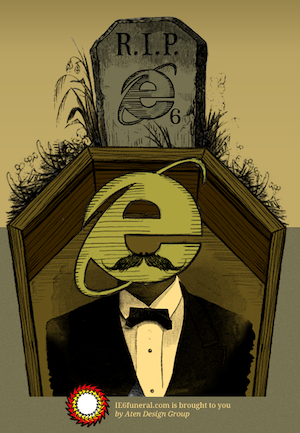A Funeral Is Being Held for IE6 on March 4. Browser to Be Buried Without the Body
MG Siegler, Tech Crunch (February 23, 2010)
In response to Google’s announcement that come March 1, it will no longer support Internet Explorer 6, the Aten Design Group is holding a funeral for the much be-loathed, cantankerous old man that is Microsoft’s eight-year ancient blunder of a browser.
Mock funerals forever! You can attend the service in person in Denver on March 4, send flowers or merely leave some memories — rants, backhanded compliments or even begrudging respect — at the memorial site. A few of our favorites (may require special knowledge to appreciate and fully ROFL):
Cromat: Enjoy that coffin and remember margin: 0 auto;height: 100%; is valid in heaven.
Danny Raede: He was the browser i used for many years. I will never forget installing xp, booting him up, and then downloading firefox.
Michał: Oh IE6… Such a hard person to please. Always thought he was more !important than everyone else. It’s like he could never fall inline and instead just float’d along by himself. And though he was often the bane of my existence, it pains me to see him now that he has Layout in the coffin. It makes me want to just * > #cry. Is that coffin 100% height?
b0ne5: I’ll always remember IE6 as a maverick. It rendered things its own way, even when all the other browsers were conforming to standards. Conforming was not in its lexicon & it refused to bow to pressure to conform to web standards. Shine on you crazy diamond!
Topher Fangio: I just rewrote a good portion of our site, and he (like an old man with thick glasses) didn’t quite see it just right. The images were distorted, and the colors looked a bit faded. Sad to go that way, looking at a bleak and awkward world…
Amos Vryhof: Die you sick twisted bastard!
Chris Shattuck: The one purpose in our existence that seems incontrovertible is that we should work steadily to improve the quality of the lives of our children and children’s children. IE6 had a difficult, highly criticized life and kept mostly to himself, but he was also successful in this one respect.
Transparency was incredibly difficult for him, perhaps because it would expose too much of his pain. But by forging his way in a world where there were no standards (at least that he was aware of), he did the hard work for his progeny, and IE6, 7 and 8 are a testament that from the flawed can emerge a greater perfection (though there’s still room for improvement). And for all his backwards ways, IE6 is still valued by holdouts across the world who rally for the qualities that he was unable to pass successfully onto the next generation. IE6, I salute you and respect your role in my world.
But damn, good riddance.
Internet Explorer 6: Hai guys! Just thought you should know I will be unable to attend… as this page is broken and does not render properly for me.
